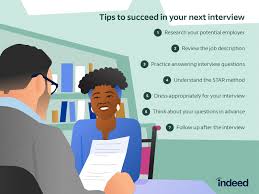How to Prepare for a Successful Job Interview

Job interviews are a critical step in securing your dream job. They give employers the chance to evaluate your skills, personality, and potential fit within their organization. Preparing effectively for a job interview not only boosts your confidence but also increases your chances of success. Here’s a step-by-step guide to help you shine in your next interview.
1. Research the Company
Understanding the company is crucial for demonstrating your interest and alignment with its goals.
- Study the company’s website: Learn about their mission, values, products, and services.
- Check recent news: Stay informed about any major achievements, challenges, or changes.
- Understand their culture: Review their social media or platforms like Glassdoor for insights into the work environment.
- Know the industry: Familiarize yourself with trends, challenges, and competitors in the industry.
2. Understand the Job Description
Carefully analyze the job posting to identify key responsibilities and required qualifications.
- Match your skills: Highlight your experiences and achievements that align with the job’s requirements.
- Prepare examples: Think of specific examples where you demonstrated the skills mentioned in the description.
- Identify questions: Note any unclear aspects of the role to ask during the interview.
3. Practice Common Interview Questions
While you can’t predict every question, preparing for common ones helps you respond confidently.
- Tell me about yourself: Craft a concise and compelling summary of your professional journey.
- What are your strengths and weaknesses?: Be honest and focus on strengths relevant to the job. For weaknesses, discuss how you’re working to improve.
- Why do you want this job?: Show your enthusiasm and explain how the role aligns with your skills and goals.
- Behavioral questions: Use the STAR method (Situation, Task, Action, Result) to answer questions like, “Tell me about a time you overcame a challenge.”
- Salary expectations: Research average salaries for the position and prepare a range if asked.
4. Prepare Your Own Questions
Interviewers often ask, “Do you have any questions for us?” Prepare thoughtful questions to demonstrate your interest. Examples include:
- “What does success look like in this role?”
- “Can you describe the team I’d be working with?”
- “What are the company’s goals for the next year?”
- “What opportunities are there for growth and professional development?”
5. Dress for Success
Your appearance makes a strong first impression, so choose attire that aligns with the company’s culture.
- Research the dress code: For formal environments, wear professional attire like a suit or dress. For more casual settings, aim for business casual.
- Keep it neat: Ensure your clothes are clean, pressed, and fit well. Avoid overly bright colors or distracting accessories.
6. Gather and Organize Necessary Materials
Being prepared with the right documents shows professionalism and attention to detail.
- Copies of your resume: Bring multiple copies in case you meet with several interviewers.
- Portfolio or work samples: If applicable, showcase examples of your work.
- List of references: Have a printed list ready, even if you’ve already submitted it.
- Notebook and pen: For taking notes during the interview.
7. Plan for Logistics
Avoid unnecessary stress by planning the practical details ahead of time.
- Know the location: If it’s in person, look up the address and determine your travel time. Arrive at least 10-15 minutes early.
- Test your tech: For virtual interviews, ensure your internet connection, camera, and microphone are working.
- Prepare a quiet space: Choose a well-lit, distraction-free area for virtual interviews.
8. Practice Good Communication Skills
Your body language and tone are as important as your answers.
- Maintain eye contact: It conveys confidence and engagement.
- Smile: A friendly demeanor creates a positive impression.
- Speak clearly: Avoid mumbling or rushing through your responses.
- Mind your posture: Sit up straight and avoid slouching.
9. Showcase Your Value
During the interview, focus on what you can bring to the company.
- Highlight accomplishments: Share measurable achievements, such as “Increased sales by 20% in six months.”
- Be solutions-oriented: Discuss how you can help solve problems or contribute to the company’s goals.
- Use examples: Real-life stories make your answers more compelling and memorable.
10. Handle Challenging Questions Gracefully
Some questions may catch you off guard. Stay calm and think before responding.
- Gaps in employment: Be honest and focus on how you used the time productively.
- Why did you leave your last job?: Keep it professional and avoid negativity about previous employers.
- Lack of experience in a specific area: Emphasize your willingness to learn and transferable skills.
11. End with Gratitude
The way you close the interview can leave a lasting impression.
- Thank the interviewer: Express appreciation for their time and the opportunity to discuss the role.
- Reaffirm interest: Summarize why you’re excited about the position and confident in your ability to succeed.
- Ask about next steps: Politely inquire about the timeline for a decision.
12. Follow Up After the Interview
Sending a follow-up email reinforces your professionalism and enthusiasm.
- Send it within 24 hours: Keep it brief and polite.
- Restate your interest: Mention one or two specific things you liked about the role or company.
- Thank the interviewer again: Show gratitude for their time and consideration.
Additional Tips for Success
- Stay positive: Maintain a confident and upbeat attitude throughout the process.
- Practice self-care: Get a good night’s sleep, eat a healthy meal, and relax before the interview.
- Learn from feedback: If you don’t get the job, ask for constructive feedback to improve for future opportunities.
Conclusion
Preparing for a job interview takes time and effort, but the payoff is worth it. By researching the company, practicing your responses, and presenting yourself professionally, you can make a strong impression and position yourself as the ideal candidate. Follow these steps, stay confident, and approach each interview as a learning experience. Success is just around the corner!



